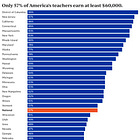Money! Money! Money!
Tennessee has a huge revenue surplus: A proposal for how to invest it for the public good
The Education Report is a reader-supported publication dedicated to reporting on education news that impacts Tennessee and the nation. If you’re not yet a subscriber, I encourage to sign up so you don’t miss an update. If you’re a free subscriber, consider that your paid support allows me to dedicate time and energy to covering education news. Click below to join or upgrade now.
Tennessee’s latest revenue numbers continue to show a state on track for a surplus this year of at least $2 billion. That’s on top of last year’s surplus that also exceeded $2 billion. The year before that, the surplus was near $2 billion.
In short, the state has tons of extra cash.
The state’s revenue forecasters are also not doing such a great job. They are many points off their forecasted numbers - year after year after year. This may well be intentional as it allows the state to budget artificially low numbers.
No matter the reason for the shoddy forecasting, the reality is the state has money just sitting around.
Even with an outrageous commitment to build a new stadium for the Titans. Even with hundreds of millions of dollars in corporate tax breaks.
There’s cash. Lots of it.

The question, then, is what should Tennessee do with all this money?
How can repeated surpluses be invested in order to benefit the public?
Good news!
I have some ideas!
I’m proposing three key investments in public education that would have an immediate and lasting impact on our state.
Teacher Pay
Tennessee is in the bottom in the nation when it comes to teacher compensation. As with our overall education spending, we rank about 45th in the country in teacher pay.
In fact, even among our neighbors in the Southeast, Tennessee’s teachers are paid relatively low.
One recent analysis found that of all Tennessee teachers, only about 25% earn more than $60,000 a year.
We can and should change that. Now.
Gov. Lee has proposed making the minimum teacher salary in the state $50,000 by the time he leaves office at the end of 2026.
Why wait?
Tennessee should raise teacher pay by 20% THIS YEAR.
That would push the minimum pay for a teacher above $50,000.
It would be a significant pay boost for ALL teachers.
It would place Tennessee first in the Southeast in teacher compensation and among the best in the nation.
Want teachers to stay in teaching? Raise their pay in a bold way.
Want to attract teachers as our state faces a teacher shortage? Raise pay.
The cost? $625 million.
Totally affordable in an environment with billions of dollars just sitting around.
School Meals
Pretty much every year, there’s a proposal to make school breakfast and lunch free for all students.
The legislature routinely rejects such efforts as too expensive.
Heck, one school district even considered hiring a debt collector to go after school lunch debt.
Here’s the deal. The fiscal note on a recent bill that would have created a free program of school breakfast and lunch for all students indicates an estimated cost of $714 million.
We can afford it.
Plus, ensuring every child has access to breakfast and lunch is a great way to give them the very basic foundation they need to learn.
Want to boost reading scores and be sure kids are more likely to be alert and ready to learn? Take away food insecurity.
If you are following along with the math, we are now at close to $1.4 billion.
Which means there’s money left.
Invest in Reading
Tennessee has a new third grade retention law in effect for this year. It’s going to impact lots of kids and school districts in a negative way.
The idea behind the law is to help boost reading readiness - that is, to ensure more kids are proficient enough in reading to “read to learn” beyond third grade.
That’s an admirable goal but the policy (retention) doesn’t actually help.
Instead, Tennessee might take a cue from Michigan, which this year repealed its third grade retention law but left in place a number of key supports for early grades reading:
"Let's use that money for reading intervention specialists, for literacy coaches, after school programs, summer school programs, to tackle the issue that way, instead of being reactive and just holding them back in a punitive and punishing way," said Rep. Nate Shannon, D-Sterling Heights.
The bill passed Tuesday repeals the retention aspect of the law, but retains other elements such as staffing recommendations, reading intervention services, and the use of evidence-based curricula and instructional material.
Tennessee should invest $500 million in Pre-K through 3rd grade reading support.
That still leaves at least $100 million of the surplus leftover.
We can and should make bold investments in public education.
Our repeated budget surpluses suggest we can afford it.
Our state’s policymakers are making a clear choice year after year.
Our students and our schools deserve better.







As usual you tell the truth!! The state can solve some of the major problems in education is the CARED!! They don't, they just want to continue to denigrate b teachers, starve children because some child could have paid, complain when children have trouble reading in the 3rd grade. Only if they Cared!!!